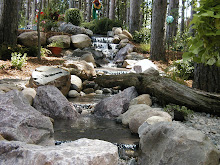So you’re thinking about getting a water feature? Congratulations! Pond ownership is an exciting hobby that provides relaxation and family fun on many levels. By building your pond following a few simple tips, you can spend time enjoying the quality of life that a water feature can provide. It’s not just a hobby; it’s a lifestyle.
So what kind of time and maintenance commitment can you expect when you install a pond in your yard? What is required of you to keep it looking as good as, if not better than, the day it was put in? We’re not claiming that a water feature is maintenance-free, but if you get yourself an all-natural, eco-friendly kind of water feature, it will be low-maintenance.The style and size of pond you build, as well as the season, will determine the amount of

maintenance required. For example, with an ecosystem pond, complete with a biological and skimmer filtration system, you can expect a few regular but quick maintenance duties. Adding bacteria during the spring, removing yellowing water lilies leaves and spent flowers, in the summer, and emptying your debris net if you’re near trees in the fall are all chores that need to be done, but only take minutes. How often these are required, depend on your pond.
In colder climates, you’ll need clean up debris from your pond, so it is properly prepared for the winter. A spring clean-out will get your pond up and running in our area. After around three years, you’ll only need to keep an eye on the pond and perform a spring clean-out every couple of years. If the pond is large enough it becomes its own naturally balanced ecosystem and takes care of itself.
All in all, pond maintenance amounts to less than most landscaped perennial borders. And if you enjoy gardening, you likely won’t see these items as chores, but rather as another enjoyable element in pond ownership.
You may have also heard about predators. The great blue heron can be a real pest around your pond, trying to catch and eat your fish, but a motion-activated sprinkler usually does the trick in scaring them off. In addition, creating places for your fish to hide when you build the pond also helps. Some raccoons may pay a visit to you water feature, and while they are generally too lazy to go to the trouble of diving in the water to catch fish, sometimes they do. If you experience a lot of raccoons, a fine mesh netting might be your answer.
The enjoyment far outweighs any little jobs you have to do around the wat

er garden and you’ll soon find that days and nights by your water garden will begin to make their way into your memories, your family scrapbooks, and your heart! You’ve surely heard about all the nightmares associated with keeping your pond clean, but if you work with Mother Nature and not against her, we think you’ll find the results quite amazing.

 As you may know, Bordines is the largest family owned production and retail nursery in Michigan and we are proud to aquire the status of their Preferred Installer.
As you may know, Bordines is the largest family owned production and retail nursery in Michigan and we are proud to aquire the status of their Preferred Installer.
 As you may know, Bordines is the largest family owned production and retail nursery in Michigan and we are proud to aquire the status of their Preferred Installer.
As you may know, Bordines is the largest family owned production and retail nursery in Michigan and we are proud to aquire the status of their Preferred Installer.




.jpg)








